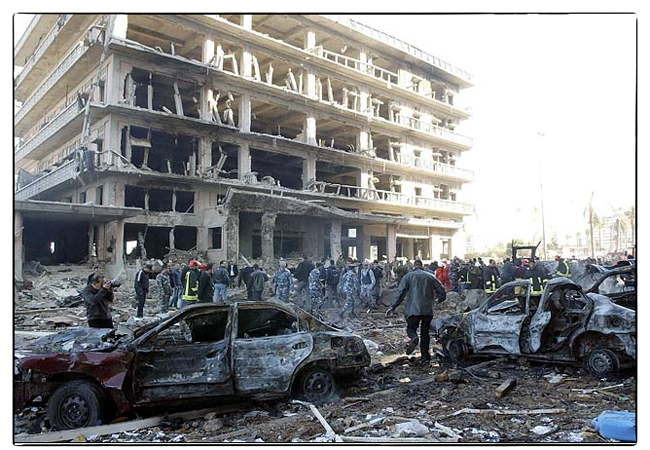
The truck bomb that killed Rafiq al-Hariri destroyed several buildings and left a 30-foot crater in the road. Photo by Wael Hamzeh/European Pressphoto Agency.
Yesterday I wrote about having lunch at the café in Place de l’Ètoile which was where the former Prime Minister of Lebanon, Rafiq al-Hariri, sat for coffee before embarking on the fateful journey that saw him assassinated. Hariri is Lebanon’s JFK and there are just as many conspiracy theories about who assassinated him as there were with Kennedy. It’s been almost eight years, but it’s still a very sensitive subject in Lebanon. People don’t like to talk about it. Ask a Lebanese who they think killed Hariri and you’re liable to get a shrug of the shoulders. Not because they don’t know but because it’s a dangerous subject to discuss.
Here is what we know: On February 14, 2005, Hariri, who is largely credited with reconstructing Beirut after the 15-year-civil war, was assassinated just after 1P.M. when a suicide truck bomber detonated 2,200 pounds of explosives as the Prime Minister’s heavily guarded six-car armored convoy passed the St. George Hotel along the Beirut seafront killing Hariri and 21 others while blowing out all of the windows of the luxurious 446-room Phoenicia Hotel.
Here is what we don’t know: Exactly who did it. From an article in The Atlantic: “Eight months (after the bomb that killed Hariri), a report to the UN about the assassination outlined a conspiracy of remarkable breadth and complexity. It revealed that three months before Hariri’s death, his security detail had been mysteriously reduced from 40 to eight; that six anonymously purchased mobile phones were used on the day of the attack to keep the bomber informed of Hariri’s movements and to provide intelligence on the three possible routes that Hariri could take from the parliament building to his home; that the suicide truck moved into position one minute and 49 seconds before Hariri’s convoy passed by; and that the truck itself had been stolen on October 12, 2004, in Sagamihara City, Japan. The killers appeared to be sophisticated, politically connected, and well-funded: clearly this was not the work of an extremist or a fringe group. It bore the hallmarks of a government-sponsored assassination.”
And who was the government sponsoring Hariri’s assassination? According to articles in the New York Times, Washington Post, Wall Street Journal and other publications, most fingers pointed directly at Syrian president Bashar al-Assad.
Syria, of course, became Lebanon’s overlord following the Lebanese Civil War as well as a state-sponsor of Hezbollah, the militant Shiite group that controls south Lebanon, and the group indicted by the Special Tribunal court in The Hague for having organized Hariri’s assassination. But as long as Assad remains in control of Syria (thus casting a huge shadow over Lebanon), everyone must be very careful of what they say about Assad’s and Syria’s role in the assassination. When Assad goes (and he will go), it might be a different matter. We’ll see.

Recent Comments